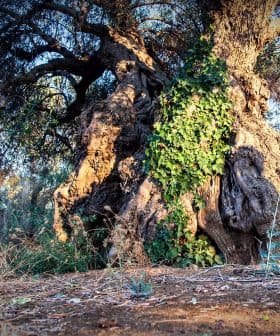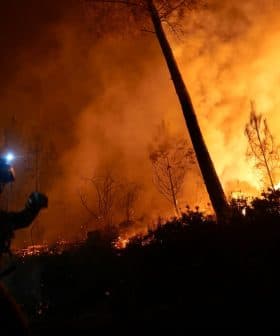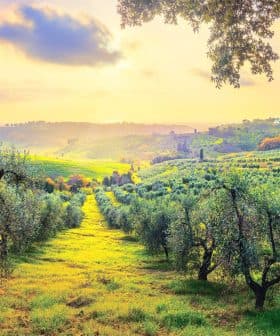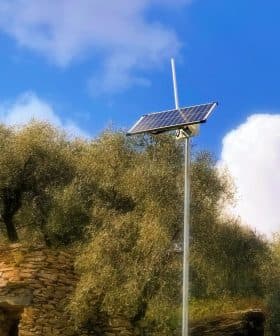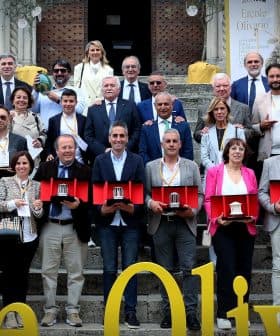Farmers, Politicians Blame Each Other as Wildfires Burn in Puglia
Farmers have blamed the rapid spread of the wildfires on dead olive trees that were killed by Xylella fastidiosa and never removed by local governments. Some politicians have insinuated that these trees are being intentionally burned.
 5.6K reads
5.6K readsMore than 1,400 wildfires have burned across the southern Italian region of Puglia in the last few weeks, destroying olive groves and areas severely impacted by Xylella fastidiosa. The local farmers association, Coldiretti, estimates that over 600 olive trees have burned in the Ugento area alone, attributing the fires to hotter-than-normal temperatures and Xylella fastidiosa.
More than 1,400 wildfires have burned across the southern Italian region of Puglia in the last few weeks, destroying olive groves and their surroundings, including areas severely impacted by Xylella fastidiosa.
The local branch of the farmers association, Coldiretti, has estimated that in a matter of days more than 600 olive trees spread over nine hectares (22 acres) have burned down in the Ugento area alone, not far from Lecce.
While fate and temperatures are obvious causes for those incidents, one could think that there are people who want to get rid of olive trees that are no longer fruitful and clear space for other ventures.
Coldiretti estimated that there has been an average of 30 fires each day this summer, a figure derived from calls to the local fire brigades as well as the local stations of the Italian Civil Protection organization.
The association believes that hotter-than-normal temperatures have fueled the wildfires, but Xylella fastidiosa has also been identified as a major cause of the spread of the fires among the groves of Italy’s largest olive oil producing region.
See Also:Natural Disasters“Thousands of trees have burned in the last two months in the Lecce area, often within abandoned groves where trees killed by Xylella still stand,” Savino Muraglia, president of Coldiretti Puglia, said.
Farmers believe that the dead trees constitute a significant risk for the spread of Xylella as well as for the safety of the countryside, as they are often surrounded by dry grass, which burns easily.
Our olive trees suffer invaluable damage and yet farmers cannot uproot the trees, plant new ones and, most of all, cultivate the needed crop diversification
“It is unacceptable,” Muraglia said. “Our olive trees suffer invaluable damage and yet farmers cannot uproot the trees, plant new ones and, most of all, cultivate the needed crop diversification.”
Coldiretti also emphasized how difficult it is for the local fire brigades to extinguish the flames, stating that up to 300 litres (almost 80 gallons) of water are required to extinguish a single olive tree.
However, the idea that Xylella is a major cause of the olive tree wildfires is not a universally accepted one, with one local politician musing that some of the fires may be set intentionally to remove problematic trees.
“Every day small and large olive orchards affected by Xylella catch on fire,” regional councilman Sergio Blasi said. “While fate and temperatures are obvious causes for those incidents, one could think that there are people who want to get rid of olive trees that are no longer fruitful and clear space for other ventures.”
Blasi is behind the approval of a regional law that forbids any Xylella-infected olive grove owner from changing the designated use of the land for at least seven years, a law which is meant to deter acts of arson in olive groves.
However, the president of the Coldiretti Lecce, Gianni Cantele, strongly denied the possibility that farmers might be setting the fires themselves.
Instead, he said the fires were proof that the region’s farmers need concrete interventions “to uproot the trees, replant their groves and let those areas come back to life after years of announcements, promises and lack of a true impetus to restore our olive heritage.”
Coldiretti asked all involved parties to finally face the Xylella threat and said it is not a problem affecting farmers alone.
“Anyone thinking that Xylella is a disease striking agriculture alone does not see the reality of the damages this pathogen has brought to the local economy as a whole,” Muraglia said. “From agriculture to tourism, all the way up to the related commercial and artisanal activities connected to agribusiness and hospitality.”
Coldiretti has said that the surveillance and maintenance of the territory’s olive groves by agricultural companies is an important step to prevent wildfires from spreading.
The association added that a recently-implemented regulation allows farmers to sign agreements with local authorities to develop and deploy practices that help safeguard the land from wildfires and other natural disasters.



